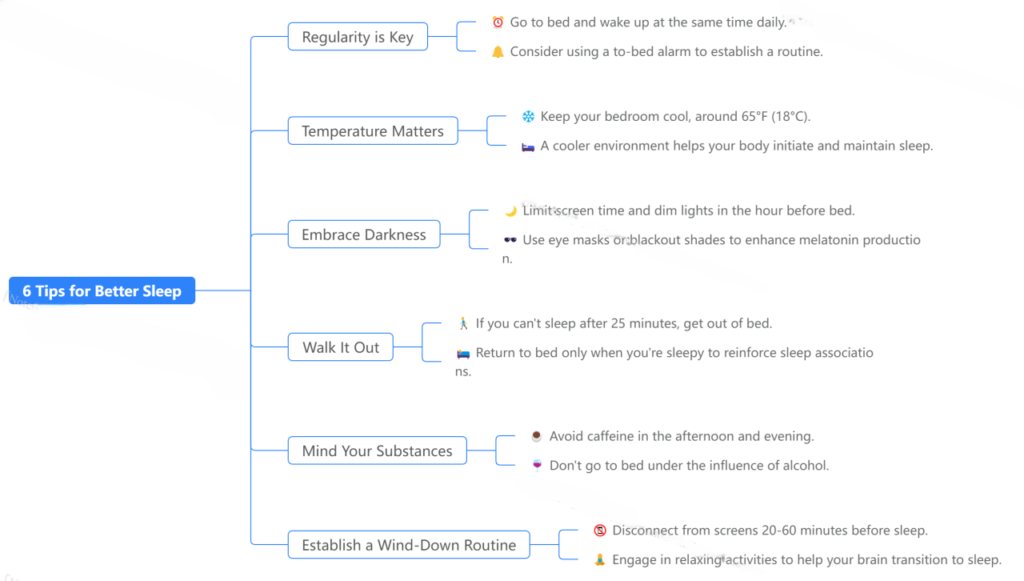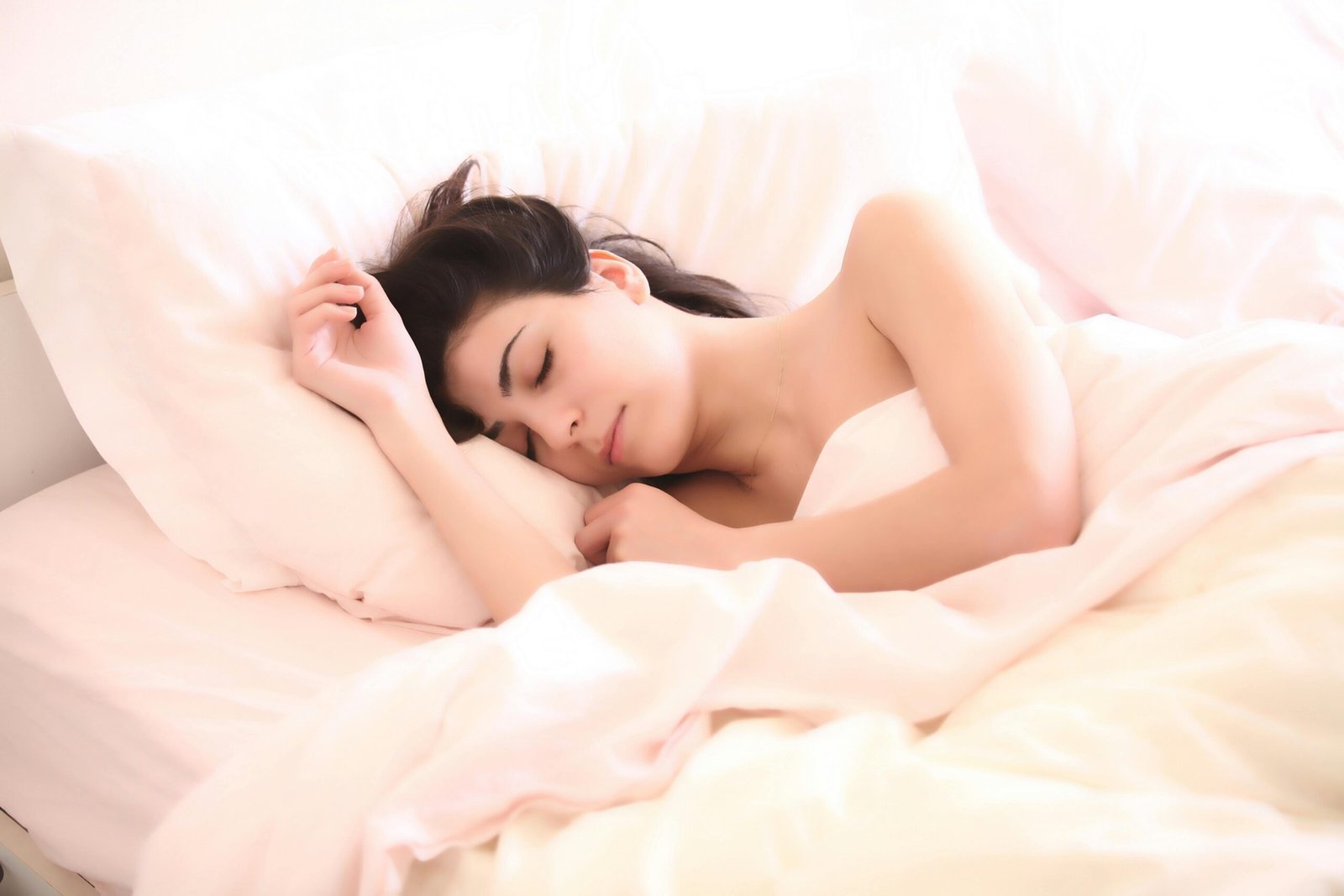Introduction to Sleep Hygiene
We can all have a bad night of sleep, and that’s perfectly normal, but how could we try to improve both the quantity and the quality of our sleep? So, let’s dive into how to improve your sleep hygiene.
6 Tips for Better Sleep: How to Improve Your Sleep Hygiene
a) Regularity is King
Why Regularity Matters:
The first tip is regularity. Go to bed at the same time and wake up at the same time. Regularity is king, and it will actually anchor your sleep and improve both the quantity and the quality, no matter whether it’s the weekday or the weekend, or even if you’ve had a bad night of sleep.
The Importance of Regularity
Deep within your brain, you have a master 24-hour clock. It expects regularity and works best under conditions of regularity, including the control of your sleep-wake schedule.
Set a To-Bed Alarm:
Many of us use an alarm to wake up, but very few of us use a to-bed alarm. This can be a helpful tool in maintaining regular sleep patterns.
b) Keep It Cool: The Role of Temperature
The Importance of a Cool Room
The next tip for improving your sleep hygiene is temperature. Keep it cool. Your brain and body need to drop their core temperature by about one degree Celsius (two to three degrees Fahrenheit) to initiate and maintain sleep.
Why a Cool Room Helps Sleep:
You’ll find it easier to fall asleep in a room that’s too cold rather than too hot. Aim for a bedroom temperature of around 65 degrees Fahrenheit (about 18 degrees Celsius). It sounds cold, but cold it must be.
c) The Necessity of Darkness: Improving Sleep Quality
Darkness and Melatonin:
We are a dark-deprived society. In the evening, we need darkness to trigger the release of a hormone called melatonin, which regulates the timing of our sleep.
Reduce Screen Time Before Bed:
Melatonin helps regulate sleep timing. In the last hour before bed, stay away from computer screens, tablets, and phones. Dim down the lights in your house; you’d be surprised at how sleepy that can make you feel.
Using Eye Masks and Blackout Shades:
Consider wearing an eye mask or using blackout shades to help regulate melatonin production and improve your sleep quality.
d) Walk It Out: The 25-Minute Rule
Avoid Staying in Bed Awake:
If you’ve been trying to fall asleep or have woken up and can’t get back to sleep after 25 minutes, get out of bed and do something different.
Relearning the Bed-Sleep Association:
Your brain associates the bed with wakefulness. By getting out of bed, you can break this association and return to bed only when you’re sleepy, gradually retraining your brain to see the bed as a place for consistent sleep.
e) Avoid Alcohol and Caffeine
Impact of Alcohol and Coffee:
Avoid caffeine in the afternoon and evening. Also, try not to go to bed too tipsy. Both substances can disrupt sleep patterns and affect overall sleep quality.
f) Establish a Wind-Down Routine
The Gradual Process of Sleep:
Sleep isn’t like a light switch. It’s more similar to landing a plane. It takes time for your brain to gradually descend into sleep. In the last 20 minutes to an hour before bed, disengage from electronics and do something relaxing.
Creating a Wind-Down Routine:
Find relaxing activities that work for you and stick to a routine to help your brain transition into sleep.
Consult a Doctor for Sleep Disorders
If you suffer from a sleep disorder, such as insomnia or sleep apnea, these tips might not be enough. Treat underlying conditions first before improving sleep quality. Consult with your doctor for proper diagnosis and treatment.
Conclusion: How to Improve Your Sleep Hygiene
We can think of sleep almost like a life-support system. Some may even call sleep a superpower. Improving sleep hygiene involves regularity, cool temperatures, darkness, movement, and a wind-down routine.
Summary
Improve sleep quality and quantity with regularity, cool temperatures, darkness, movement, and a wind-down routine.
Highlights
🕒 Regularity: Go to bed and wake up at the same time daily.
❄️ Temperature: Keep your bedroom cool, around 65°F (18°C).
🌑 Darkness: Limit screen time and dim lights in the evening.
🚶♂️ Movement: Get out of bed if you can’t sleep after 25 minutes.
☕️ Caffeine & Alcohol: Avoid them in the afternoon and evening.
🛌 Wind-down Routine: Engage in relaxing activities before bed.
🩺 Consult a doctor if experiencing sleep disorders.
Key Insights
🕔 Regularity: A consistent sleep schedule helps regulate your body’s internal clock, improving overall sleep quality.
🌡️ Temperature: A cooler sleeping environment aids in the body’s natural temperature drop needed for sleep onset and maintenance.
🌙 Darkness: Exposure to natural darkness boosts melatonin production, crucial for sleep.
🔄 Movement: Breaking the association between wakefulness and bed can help retrain your brain to view the bed as a place for sleep.
🚫 Caffeine & Alcohol: Avoiding these substances supports better sleep hygiene.
🌌 Wind-down Routine: Establishing a pre-sleep routine allows for a smoother transition into sleep.
🩺 Professional Help: For persistent sleep issues, consult a healthcare provider for proper diagnosis and treatment.
Mindmap

Related Posts
How Daily Meditation Can Change Your Life: The Power of Mindfulness

1 thought on “How to Improve Your Sleep Hygiene : The Importance of Sleep”